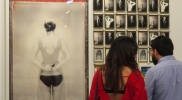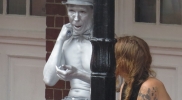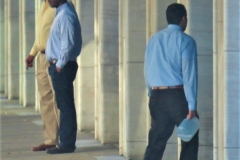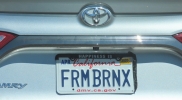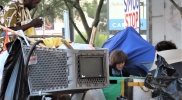|
|
Best Trivia - Cinematic
|
Favorite Trivia – LUCK & GRATITUDE & FATE & DESTINY & CHANCE
|
| “You never know what worse luck your bad luck has saved you from.”
Cormac McCarthy – No Country for Old Men
|
|
“We must believe in luck. For how else can we explain the success of those we don’t like?”
Jean Cocteau
|
|
“Upon the conduct of each depends the fate of all.”
David Baird – A Thousand Paths to Good Luck
|
|
“I am the one who creates part of my fate, and I’ll fight destiny all the way.” [Sylvia Plath’s high school diary]
Sylvia Plath – Letters Home: Correspondence 1950-1963, ed. by Aurelia Schober Plath
|
| French: “Il tombe sur le dos et se casse le nez.”:
English: “He falls on his back and breaks his nose.” (Said of a notoriously unlucky man.)
Chamfort
|
| “Fate deal us the hand and we play the cards.”
David Baird – A Thousand Paths to Good Luck
|
| “Believe this: any person would find their sorrows much increased if their future fortunes were known to them today.”
David Baird – A Thousand Paths to Good Luck
|
“The Life of man is but a game of dice:
And, if the throw you most want does not fall,
You must then use your skill to make the best
Of whatsoever has by chance turned up.”
P. Terentius Afer – Adephi, trans. by W. Francis H. King
|
| “A man is not to be sneered at for having a trump card in his hand; he is only to be sneered at if he plays his trump card badly.”
Samuel Butler – The Way of All Flesh
|
| “Travel life with your eyes and ears open. You never know what you might be lucky enough to overhear or witness.”
David Baird – A Thousand Paths to Good Luck
|
| “It’s true that being ‘grounded’ by my wheelchair has its downside. Not traveling as much deprives me of visiting the old friends I used to see in Boston, New York, all the places I used to visit on tour, and I miss that. But mostly I find that I’m very comfortable having the wheelchair. I can even see ways I cling to it. Who wouldn’t rather ride than walk? Or always have a seat at parties? When I do travel, I whiz through the airport at the speed of light in my wheelchair, going ‘Beep-beep! Beep-beep!’ to warn the pedestrians.”
Ram Dass – Still Here: Embracing Aging, Changing, and Dying
|
| “Count all your failures and you will show a loss. Count all your assets and you will always show a profit.”
David Baird – A Thousand Paths to Enlightenment
|
| “Rom Dass’s optimism is not merely confined to his sense of humor; it goes deeper. ‘I’ve grown to love my wheelchair (I call it my swan boat),’ he writes in Still Here; pointing out that Chinese emperors and Indian maharajahs are carried on palanquins, he adds, ‘In other cultures, it’s a symbol of honor and power to be carried and wheeled.'”
Henry Alford– How To Live: A Search for Wisdom from Old People
|
“… if you’re eager to learn the behavior
Of the human race, this courthouse should more than suffice you.
Spend a few days there, and when you come out, you will hardly
Dare call yourself out of luck.”
The Thirteenth Satire: For a defrauded friend (The Satires of Juvenal – trans. by Rolfe Humphries)
|
| “It is in no man’s power to have whatever he wants; but he has it in his power not to wish for what he hasn’t got, and cheerfully make the most of the things that do come his way.”
Seneca
|
| “Why spend your life worrying about the future—you will know it when it comes.”
David Baird – A Thousand Paths to Tranquillity
|
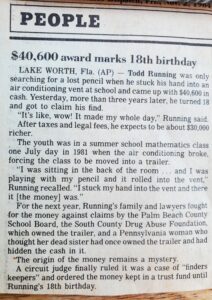
$40,600 award marks 18th birthday, Richmond Times-Dispatch, November 2, 1984 |
| “We put an ad in the paper for our flat . . . two couples arrived and decided they wanted it at the same time. Very awkward, especially as Ted and I liked one couple—the boy, a young Canadian poet [David Wevill and his wife Assia (for whom Ted leaves Sylvia less than a year later)]; the girl, a German-Russian whom we identified with. As they were too slow and polite to speak up, officially the other chill, busybody man got it by sitting down and immediately writing out a check. We felt so badly we tore up his check that night and told him we were staying and then dug up the other couple and said they could have it. . . The couple are coming to supper this week. ” [August 13, 1961] “We have a nice young Canadian poet and his very attractive, intelligent wife coming down for the weekend—they’re the ones who took over our lease for the London flat. ” [May 14, 1962]
“This is the richest and happiest time of my life. The babies are so beautiful. ” [June 7, 1962]
“I don’t know when I’ve been so happy or felt so well. ” [June 15, 1962]
Aurelia Plath: “On July 9, when Sylvia and I left Ted with the children in order to drive to Exeter for shopping and lunch, Sylvia said proudly, ‘I have everything in life I’ve ever wanted: a wonderful husband, two adorable children, a lovely home, and my writing.’ Yet the marriage was seriously troubled, and there was a great deal of anxiety in the air. Ted had been seeing someone else [Assis Wevill], and Sylvia’s jealously was very intense.”
“I hope you will not be too surprised or shocked when I say I am going to try to get a legal separation from Ted. [August 27, 1962] “I am getting a divorce. It is the only thing. . . I should say right away America is out for me. I want to make my life in England. If I start running now, I will never stop. I shall hear of Ted all my life, of his success, his genius . . . I must make a life all my own as fast as I can . . . the flesh had dropped from my bones. But I am a fighter. Money is my only way to fight myself into a new life. [October 9, 1962]
“The one thing I retain is love for and admiration of [Ted’s] writing. I know he is a genius, and for a genius there are no bonds and no bounds. . . It is hurtful to be ditched . . . but think God I have my own work. If I did not have that I do not know what I would do. I have a considerable reputation over here and am writing from dawn to when the babes wake, a poem a day, and they are terrific.”
Sylvia Plath – Letters Home: Correspondence 1950-1963, ed. by Aurelia Schober Plath
|
| “Lucky charms are merely emotional crutches. Remember as you stroke your rabbit’s foot for luck that it was anything but lucky for the poor rabbit.”
David Baird – A Thousand Paths to Good Luck
|
| “‘Jean-Baptiste Toussaint is one of my colleagues. . . It appeared that he had gone to Monte Carlo in one of his restless moods. . . And since he hadn’t yet been there, he decided to spend his last evening at the Casino. . . He found himself a place at one of the tables and put all the money he had, a mere twenty francs, on rouge. Then he suddenly remembered that he’d promised to phone one of his girls. Since he thought it would be a brief call—all he wanted was to cancel an arrangement for the following day—he left his stake where it was, convinced that he’d be back before the croupier called rein ne va plus. However . . . the girl immediately started quarrelling with him. . . Meanwhile, rouge came up and the twenty francs were doubled.
“‘Since Jean Baptiste wasn’t there to change his bet, the forty francs stayed on rouge and again it came up. Now there were eighty francs staked. The girl was still screaming at Jean-Baptiste who was vainly trying to calm her down. Meanwhile, the ball kept settling on rouge and the eighty francs became 160, then 320, then 640, and 1280. People began to notice that something was going on and left their tables to watch breathless as Jean-Baptiste’s money simply redoubled itself. The croupier became nervous and stepped up the pace of the game but still the ball settled on rouge.
“‘In the telephone kiosk the quarrel still raged on. Jean-Baptiste was so busy with the girl that he had quite forgotten his twenty francs. The girl began to cry, of course. And at the table, something that had not happened for years in the Casino was suddenly occurring before the astounded eyes of the fascinated crowd: the little ball fell on rouge fourteen times in succession. The twenty francs had grown into three hundred and twenty seven thousand, six hundred and eighty. Would you believe it? At that moment Jean-Baptiste slammed down the phone and returned angrily to the roulette table. As soon as he entered the gaming room, he realized that something was going on at his table. There was a deathly silence and everyone had gathered around the nervously sweating croupier, who kept putting a fresh pile of fiches [chips] at Jean-Baptiste’s place. He joined the crowd and, realizing what was happening swept the chips off the table just as the croupier was about to call his desperate rein ne va plus. If he had acted a split-second later, he would have lost everything. The little ball slowly settled on noir.
‘And that’s how Jean-Baptiste became a rich man in a matter of minutes.’”
Armand Coppens – The Memoirs of an Erotic Bookseller
|
| “What is the fate of the lucky man? Throw him into the sea and he is likely to come up with a pearl clenched between his teeth.”
David Baird – A Thousand Paths to Good Luck
|
| “All life is about chance, so take some. Those who are most willing to do and dare are the ones who generally get lucky and go further in life.”
David Baird – A Thousand Paths to Good Luck
|

Comments are closed.
|
|















